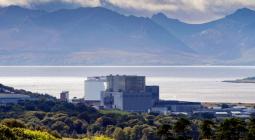UK’s nuclear sites costing taxpayers ‘astronomical sums’, say MPs.

Public accounts committee says ignorance, incompetence and weak oversight to blame.
The Nuclear Decommissioning Authority (NDA) has a perpetual lack of knowledge about the state and location of waste on the 17 sites it is responsible for making safe, a powerful committee of MPs has found.
This results from decades of poor record keeping and weak government oversight, the MPs said. Combined with a “sorry saga” of incompetence and failure, this has left taxpayers footing the bill for “astronomical sums”, they said.
The NDA acknowledges that it still does not have full understanding of the condition of its sites, including 10 closed Magnox stations from Dungeness in Kent to Hunterston in Ayrshire, the MPs report said.
The NDA’s most recent estimate is that it will cost current and future generations of UK taxpayers £132bn to decommission the civil nuclear sites, with the work not being completed for another 120 years.
Since 2017, the NDA’s upper estimate of the cost of the 12-15-year programme just to get the sites to the ”‘care and maintenance” stage of the decommissioning process has increased by £3.1bn to £8.7bn. “Our past experience suggests these costs may increase further,” said the MPs’ report.
The lack of knowledge of the sites was a significant factor in the failure of a 2014 contract the NDA signed with a private sector company to decommission the Magnox sites. The government was forced to take back the contract in 2018 and the botched tender has now cost taxpayers £140m, the MPs found.
Sir Geoffrey Clifton-Brown, deputy chair of the public accounts committee (PAC), said: “Although progress has been made since our [2018] report, incredibly, the NDA still doesn’t know even where we’re currently at, in terms of the state and safety of the UK’s disused nuclear sites. Without that, and after the Magnox contracting disaster, it is hard to have confidence in future plans or estimates.”
“The NDA, with stronger, better oversight from government, must make a clear break with the incompetence and failures of the past and step up to maximise [the use of] the astronomical sums of taxpayers’ money it has absorbed,” he said.
Meg Hillier, the PAC chair, said: “The UK went from leading the world in establishing nuclear power to this sorry saga of a perpetual lack of knowledge about the current state of the UK’s nuclear sites.”
The MPs recommended the NDA speed up its work: “It may be possible to reduce the time it will take to fully decommission the sites from around 85 years to more like 40-45 years. This could significantly reduce the long-term cost.”
They also said taxpayers’ money could be saved by accelerating the programme to create a geological disposal facility to permanently store highly radioactive waste currently held in interim facilities. Cumbria county council rejected government plans to undertake preliminary work on this in 2013.
A spokeswoman said the NDA welcomed the PAC’s scrutiny and its recognition of the challenges of cleaning up old nuclear sites and would look carefully at the recommendations. “We do not accept the suggestions that we may not understand the safety of our sites,” she said. “Our work is tightly and independently regulated to ensure we uphold the highest standards of safety. Our focus remains on ensuring we deliver this work of national strategic importance safely, effectively and efficiently.”
The UK has eight operating nuclear power plants, with all but one due to retire in the next decade. Only one new plant is being built, at Hinkley Point in Somerset, and it is years behind schedule and billions over budget.
Despite recent speculation over another new plant being given the go-ahead at Sizewell in Suffolk, Boris Johnson failed to announce this in his green industrial revolution plan last week. The government’s new national infrastructure strategy, published on Wednesday, said: “The government is pursuing large-scale nuclear projects, subject to clear value for money for both consumers and taxpayers.”
In 2015, the government stripped another private consortium of a £9bn contract to clean up the nuclear waste site at Sellafield. The company had been heavily criticised for its executives’ expense claims which included a £714 bill for a “cat in a taxi”.
27 November 2020
The Guardian




